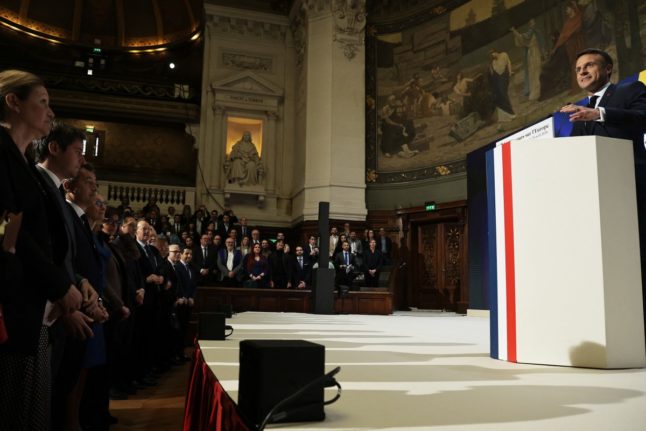With three years to spare President Emmanuel Macron has delivered both the main legislative promises of his second term.
The first – pension reform – caused weeks of strikes and unrest on the streets earlier this year.
The second – a new immigration law – carved a deep chasm on Tuesday night in Macron’s coalition of the centre, moderate right and moderate left.
What is the President going to do with his remaining three years?
The original sin, of course, was Macron’s failure to win a majority in the National Assembly in June 2022, only two months after he became the first French president re-elected for two decades.
Since then he has not dared to call new elections. Nor has he managed to expand his coalition. Nor has he refused to give up his legislative ambitions.
To achieve pension reform, he used his constitutional powers to short-circuit a normal vote in the National Assembly last March.
To enact his “balanced” changes in immigration law, his government yesterday swallowed 60 hard-line new clauses imposed by a jubilant centre-right. The law is no longer balanced.
READ ALSO Is France’s immigration bill really a ‘victory for far-right ideology’
The left-hand side of the Macron coalition was appalled. Almost one in four government deputies – 59 of the 251 – voted “Non” or abstained. The health minister, Aurélien Rousseau, resigned.
Marine Le Pen, in a clever last-minute ploy to compound the embarrassment of the Macronistes, ordered her 88 far-right deputies to stand on their heads and support the revised law. She claimed an “ideological victory” because several of the new clauses echoed Rassemblement National rhetoric.
(This phrase was revealing. It amounted to an admission that her obsession with immigration is an ideology, not a practical response to real problems.)
However, all may not quite be what it seems in the new law.
Several of the most contentious changes – including limits on the rights of French-born children of foreigners to become French – are likely to be amputated by the constitutional watchdog, Le Conseil Constitutionnel.
The government knew that this was the case. President Macron referred the law to the “sages” himself.
At least half of the 60 new clauses imposed by the centre-right, and inspired by the far-right, are dubious for two reasons. They may infringe the constitution’s guarantee of equal rights for all. They go beyond the stated scope of the law.
Cynicism by Macron and his government or clever tactics?
Either way, by angering the left side of his coalition, the President has placed at risk the twin promises at the original core of Macronism.
The first was a promise to unite the constructive centre-left and the constructive centre-right in a peaceful revolution to dismantle the barriers which suppress France’s energy and creativity.
The second was a promise to defeat the populist extremes of right and left and uphold the ideals of humanism, democracy and European unity.
The “revolution” has, in fact, turned out to be a kind of top-down, managerial reformism. No matter. Its achievements are more significant than opponents or the polarised right-left French media are willing to admit.
The pension reform was clumsy but necessary. Changes in labour law have reduced unemployment to its lowest level in 40 years (although the rate is edging up again). France is adding factories and industrial jobs for the first time this century.
France’s ecological record under Macron is patchy but better than many other industrial countries. His prescriptions for a stronger, more “sovereign” Europe have proved to be prescient. His support for Ukraine has been realistic but staunch.
There is, however, another side to the ledger. Macron has failed to create a sustained narrative of beneficial reform. He has failed to build a strong, or even a weak, grass-roots movement.
The greatest test of Macronism is yet to come. Can it survive Macron? Can the Centre hold in 2027?
The row on immigration policy this week makes that challenge harder.
First, it has opened up, for the first time, a left v right breach in the Macron alliance. The President boasted that he had taken France beyond the old rivalries and rigid thought-patterns of right and left.
The rebellion on Tuesday – limited though it was to only one minister – suggests that the old fault-lines persist.
Second, it may have an impact on the 2027 presidential election (when Macron cannot run again). Left-wing voters may be less willing to switch to Macron’s centrist successor in the second round run-off to “block Le Pen” if they believe (rightly or wrongly) that the centre has betrayed them by flirting with the far-right.
This was a calculated risk. Macron took the view that a failure to address glaring problems with migration law – 85 percent of illegal migrants expelled from the country never leave – would be an electoral goldmine for Le Pen.
He also took the view that the moderate left would stick with him and with his successor because they have nowhere else to go. The Parti Socialiste has all but collapsed at national level. The vain and sectarian Jean-Luc Mélenchon hates the moderate left and they hate him.
It was an enormous risk all the same.
Macron now has three years to glue the disparate elements of the centre back together. A Constitutional Council decision to de-toxify the migration law will help.
But the President also needs to find a Big Idea – possibly a more radical approach to environment policy.
His current temptation is to rescue his promise of full employment (ie no more than 5.5 percent out of work) by 2027 by talking a reforming axe to labour law and unemployment pay.
That is unlikely to rebuild his support on the soft and sensible left.
So what is the President’s next Big Idea? Answers on a post-card please to E. Macron, 55 Rue du Faubourg Saint-Honore, 75008 Paris.



 Please whitelist us to continue reading.
Please whitelist us to continue reading.
It’s always nice to read Lichfield’s balanced views on French politics. The Guardian and the New York Times often write alarmist pieces about the terrible things going on in France. Then it’s a relief to read John, and realize I’m not alone in thinking the press has it wrong. But then of course, nuance doesn’t sell newspapers.